Launch diplomatic offensive
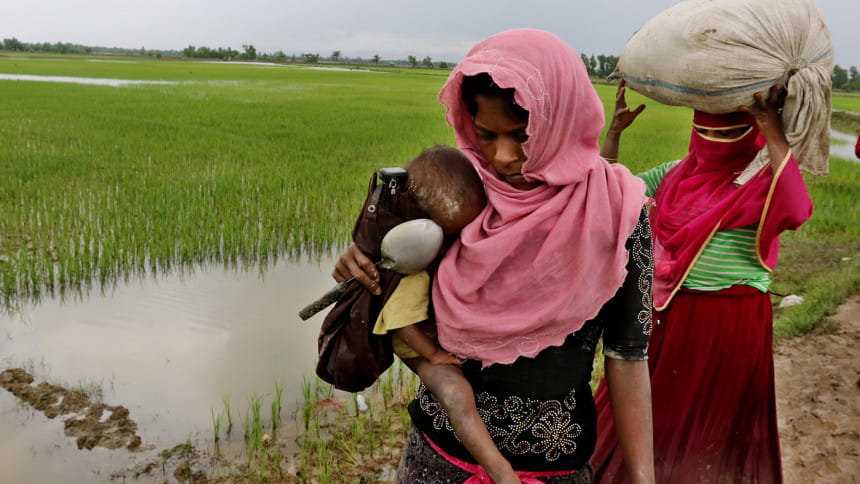
In the wake of an active genocide in Myanmar and the resulting influx of Rohingyas into Bangladesh, Dhaka should launch a vigorous diplomatic initiative to internationalise the crimes Myanmar is committing in Rakhine state and solicit support for a peaceful solution, experts have said.
Bangladesh has to engage regional and international actors and immediately send envoys to China and India -- the most important partners of Bangladesh and Myanmar -- to persuade them to use their good offices to influence Naypyidaw to stop the atrocities and bring it to the negotiation table, they said.
Given the outright denial and total disregard for international and humanitarian norms by Myanmar, experts including former diplomats, army generals and academics said Bangladesh should raise the Rohingya issue prominently in the upcoming meetings of the United Nations General Assembly and the Organisation of Islamic Cooperation through other countries.
Criticising the "ad hoc policy" taken up by successive governments on the Rohingya issue, they recommended formulating a well-drawn strategy to deal with the issue that has already created a huge problem for Bangladesh.
They welcomed the government decision to allow the Rohingyas in and sequester them in camps and suggested that the registration of the refugees be completed as soon as possible.
The entry of each of these victims of persecution should be recorded so that the issue could be placed before the international community along with proper documentation, they said.
It is also important to arrange shelter for them in a certain area, they noted.
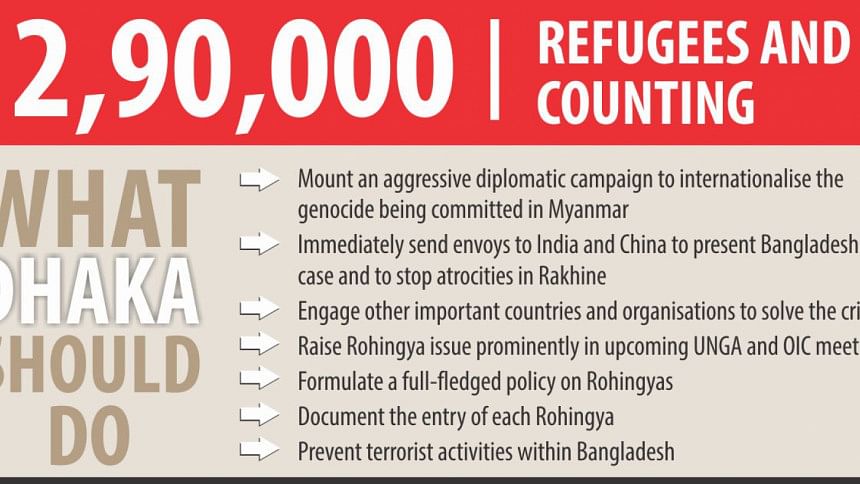
They also expressed serious reservations about the government proposal to conduct joint operation along Bangladesh-Myanmar border and said Bangladesh should not push back anyone fleeing the persecution.
They offered these recommendations and opinions at a roundtable organised by The Daily Star at its office yesterday.
The discussion was held amid international outcry over the atrocities against Rohingyas, with an estimated 2,90,000 of them fleeing to Bangladesh in the last two weeks alone.
Brig Gen (retd) Shahedul Anam Khan, associate editor of The Daily Star, moderated the discussion.
The Daily Star Editor and Publisher Mahfuz Anam said Bangladesh was facing new challenges that had humanitarian, diplomatic and security dimensions.
"It's very shocking that Myanmar is on total denial mode.... the ferocity of the atrocity on the people is unbelievable," he said, adding that so far the responses from India and China had been very disappointing.

This is one of the most complex security and humanitarian situations that Bangladesh has ever faced, he said, stressing the need for a firm and united stance to face the crisis.
Talking about an "enhanced level of brutalities" by Myanmar forces, CM Shafi Sami, former adviser to a caretaker government, said, "It is perhaps what they say completion of the unfinished task of the neighbouring regime that started in 1962 and in a way found culmination in 1982, and so far the cleansing is not accomplished.
"Myanmar today has a facade of democracy... Because the generals despise the state councillor [Suu Kyi]. The state councillor is afraid of the generals."
From behind the scene, the military junta is carrying on the policies that were initiated as early as in 1962 and they are taking advantage of the image of Nobel Laureate Aung San Suu Kyi, he said.
"I agree that Bangladesh has been patient, mature and we have tried to resolve the issue bilaterally. However, I also find that there is, perhaps, a gap somewhere in the context of what happened in the recent past. We may not have properly evaluated two aspects of the issue," he said.

One aspect is that Bangladesh is overwhelmed with the influx which is causing socio-economic problems, and the other aspect is human rights, the genocide, religious persecution and ethnic cleansing which is going on, he said.
"So far, our attention has been focused only on the first aspect. I think it is only lately that we decided to make it [human rights violation] an issue and that is where we lag a little behind. [Focusing on] that aspect -- the context of increased brutality and denial of Myanmar authorities -- would have been more productive," he said.
"We should highlight the violation of human rights and the genocide taking place," he said.
Brig Gen (retd) M Shakhawat Hussain said the Rohingya issue posed external and internal security threats to Bangladesh.
"Because, this [Myanmar] force is breathing on our shoulder. Almost every day, as I learned from newspapers, the forces are firing here and there and their helicopters violated our airspace," he said.
"Of course, the option is a very proactive and aggressive diplomacy. Have we sent anybody to China? I don't know. Have we discussed with Delhi? We don't know.

"I don't know why we could not engage China? This is the only country that I believe has influence on the Myanmar military.
"Unless we can pressurise the Myanmar military, this problem is not going to be resolved.... I think we must engage China ... and of course India and the US too."
Prof Imtiaz Ahmed of Dhaka University's international relations department also emphasised on a pro-active and multi-layered policy.
He said nobody could deny that atrocities had been committed in Rakhine and security forces failed to prevent the atrocities.
Since they have failed, there should be an international peace keeping force and that is the argument Bangladesh should place before the international forums, he said.
Prof Imtiaz said Rohingyas had fled to other countries as well. So there should be an international conference, with or without UN involvement, with these countries.
"It was high time we sent envoys to India and China as Myanmar has already done so," he added.
Talking about the reasons behind the current situation, M Humayun Kabir, former ambassador and vice-president of Bangladesh Enterprise Institute, said that some fundamental changes took place in Myanmar after 2011, when the democratic process began there.
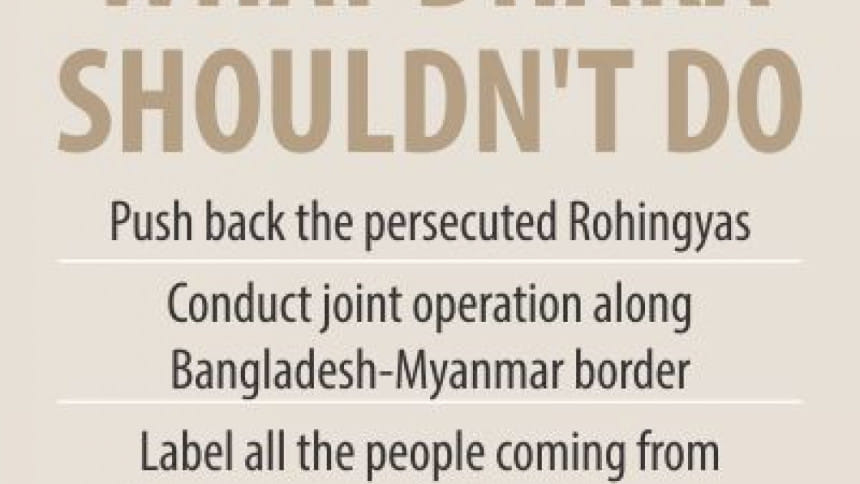
One is the rise of MaBaTha Movement, a religious nationalist movement of Buddhists which is very popular in Myanmar. This group sees Muslims as their enemy.
"So we have to understand the transformation that is taking place in Myanmar society itself. They have made their strategy a long time ago and are now implementing those phase by phase," he said.
Besides, the Myanmar government has enacted four laws in 2015, and all these laws go against Muslims, he said.
Humayun Kabir said Bangladesh's policy over Rohingya issue had basically been ad hoc.
"We did not have a strategy to deal with the Rohingya issue. It has been there for 30 years.... But now it looks like it is becoming a real problem. Because, Myanmar is giving its final push," he said.
"We need more diplomacy... But we do not see the robust diplomacy that we need. And in terms of going forward, I think starting point should be sending political leadership to the capitals of the P5s [five permanent members of the UN Security Council] first to find out where they stand on the issue. If we get some 'go forward,' then our foreign missions can start working," he added.
SM Nurul Hoque, president of Bangladesh-Myanmar Chamber of Commerce and Industry, said the US, China and India had huge investment in Myanmar and so it was difficult for them to consider Bangladesh's interest over their own.
He recommended using the Saarc to solve the problem.
Maj Gen (retd) Mohammad Shamim Chowdhury, former general officer commanding (GOC) of 24 Infantry Division and area commander of Chittagong, said even though Myanmar was now denying the existence of Rohingyas, in 1978 the then deputy minister of Myanmar had signed a document with Bangladesh recognising Rohingyas.
The document is available online, he said.
Sharing his experience on the ground when he was the GOC between 2008 and 2010, he said, "Due to local politics, we don't want to call the Rohingya people refugees.
"With the votes of Rohingyas, local members and chairmen want to win elections and that is why they do not allow them to become registered refugees."
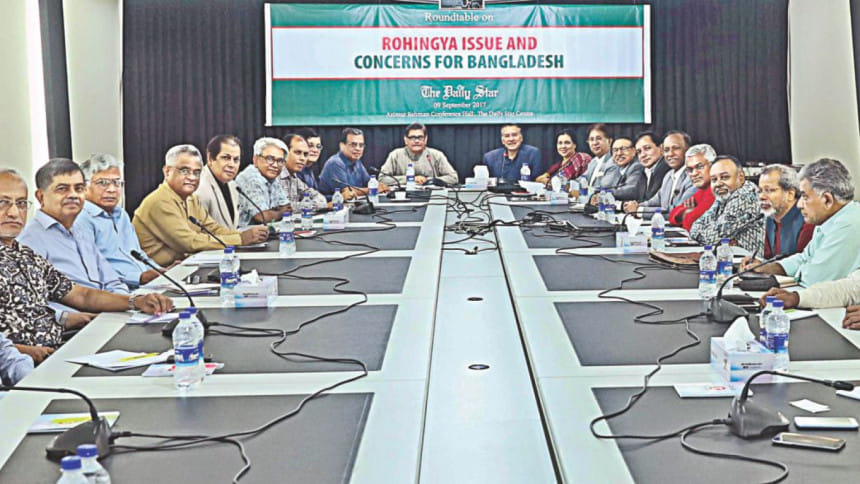
He said Bangladesh could have played the refugee card had it registered all Rohingyas since they started coming to Bangladesh.
Shamim, also an advisory editor of The Asian Age, said there was a dilemma for Bangladesh regarding national security and the humanitarian aspect.
"We have received all Rohingyas but officially we are saying that Myanmar or the Rohingya issue is not our issue, whereas this is our big problem.
"We have been officially saying that we push back a certain number of Rohingyas every day, even though we cannot do that. We should have a clear policy that we will register every Rohingya that enters Bangladesh under the present situation."
He said the refugees should be kept under UN supervision.
Former ambassador Shamim Ahmed said Bangladesh should convince the international community to put pressure on Myanmar so that it stopped what it was doing to Rohingyas.
"Otherwise, there will be no way to stop the influx of Rohingya refugees."
Former inspector general of police Muhammad Nurul Huda said Bangladesh should make the international community see "the clear case of genocide and ethnic cleansing in Arakan" and drum up international support.
"We should internationalise and focus on the issues of atrocities and brutalities against the Rohingya people … . Otherwise, those people will not return [to Myanmar]."
Huda said the ethnic cleansing carried out by Myanmar was planned.
The former boss of Bangladesh police said not registering all Rohingya refugees who entered Bangladesh over the last two weeks was a mistake. "Without registering them, we will not be able to tell the international community about the influx."
He welcomed the government's latest step to keep the refugees in a certain area of Cox's Bazar.
Former ambassador Maj Gen (retd) Mohammad Ashab Uddin said Bangladesh should go for strong diplomatic efforts and engage all major actors, including China and India.
He did not find Bangladesh's proposal for establishing a safe zone inside Myanmar viable.
Prof Amena Mohsin of Dhaka University's international relations department said Myanmar had a specific Rohingya policy but Bangladesh had none. She said Bangladesh was dealing with the matter on ad hoc basis.
Genocide and crimes against humanity were being committed in Myanmar and the matter could be taken to International Court of Justice, she said.
Former ambassador M Serajul Islam said Rohingyas were facing something similar to what Bangladeshis had faced in 1971.
He said the government should tell India and China that they should not stand by the perpetrators of genocide.
CR Abrar, a professor of international relations of Dhaka University and also the co-coordinator of Refugee and Migratory Movements Research Unit, said it was unfortunate that concerted efforts were being made by a section of the civil society and media people to label the Rohingya refugees as IS terrorists or BNP-Jamaat agents.
He said the government's policy towards the refugees was absolutely myopic and of ad hoc basis.
"Our most trusted neighbour was not acting in our favour."
Former ambassador Mahmood Hasan criticised the Kofi Annan-led nine-member multi-sector advisory commission.
He said the report of the commission set up by the Myanmar government to investigate allegations of rights abuses against Rohingyas was wishy-washy, which was unexpected.
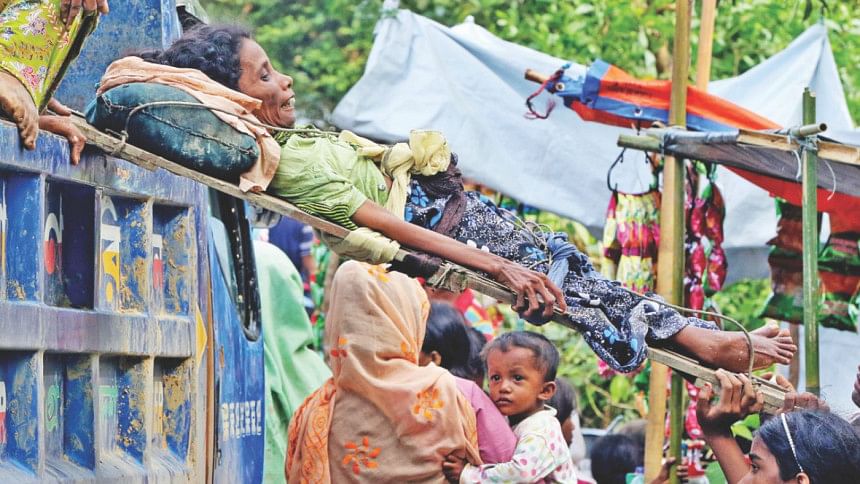
"The Kofi Annan Commission didn't mention the Rohingya people as Rohingyas. Rather, they termed them as the Muslim community of Rakhine."
He said, "Even though we consider India and China as our friends, they are not acting in our favour. I think it is wrong to say that they are our friends. We will have to depend on ourselves."
He too opposed the idea of creating a safe zone for Rohingyas and criticised the division between political parties of Bangladesh over the Rohingya issue.
Munshi Faiz Ahmad, chairman of Bangladesh Institute of International and Strategic Studies (BIISS), said acting on ad hoc basis was not always a bad thing.
He made several suggestions, including keeping the refugees in a controlled area, properly registering them, engaging the international community, raise the issue at international forums like the UN, Asean and Commonwealth.
He said the government could organise an inter-faith dialogue where representatives of countries, including Myanmar, would be present.
Fazle Elahi Akbar, BNP's chief coordinator on defence and security matters, said alongside an aggressive diplomatic campaign, a forceful media campaign was needed to be launched against the brutal atrocities on Rohingyas.
Former ambassador Shahed Akhtar suggested holding a regional conference in Cox's Bazar to inform the international community about the sorry state of Rohingya refugees.
Chowdhury Khalequzzaman, another former ambassador, said Asean countries, Japan and China could do a lot to address the issue.
Former foreign secretary Shamsher M Chowdhury said the world community was sleeping and that was why there was genocide in Rwanda and in the Balkans. "What's going on in Rakhine state is not a humanitarian issue. It's a political issue. It's ethnic cleansing."
Maj Gen AKM Abdur Rahman, director general of BIISS, said, "Bangladesh must raise its voice against the atrocities being carried out on Rohingya people in Rakhine state. Bangladesh has been patient enough over the issue."
Asif Munier, migration and refugee affairs specialist, also spoke.

 For all latest news, follow The Daily Star's Google News channel.
For all latest news, follow The Daily Star's Google News channel. 



Comments